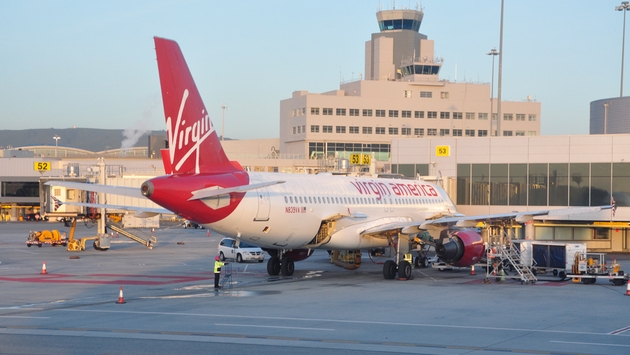By Paul Thompson
Since entering the market in 2007, travelers have loved Virgin America. The San Francisco-based airline has been the recipient of almost every award for customer service and inflight entertainment. But one problem that has overshadowed them is the bottom line. The company announced last week they they’re talking to potential suitors about a sale, and it was revealed on Monday afternoon that both Alaska Airlines and JetBlue are pitching a sale.
Many view JetBlue as the ideal mate for Virgin America. They’re based on opposite coasts, with Virgin America in San Francisco, and Jet Blue in New York. Both airlines fly the Airbus A320 family of planes, and JetBlue also flies some smaller jets made by Embraer in Brazil. Fleet commonality is a big deal, because it allows airlines to swap planes easily if one goes out of service for maintenance, and also reduces the cost of training pilots.
Airlines with a diverse fleet have to either keep groups of pilots segregated based on their qualifications known as type ratings, or they have to train every pilot to fly every aircraft, which can be quite expensive.
After nearly major airline in the U.S. merged within the past 10 or so years, potential mergers face increased scrutiny because mergers reduce the number of airlines, and less airlines means less competition. Less competition leaves the door open to potential price increases where an airline controls the market. However, JetBlue and Virgin America only overlap on 10 of their routes, or 24 percent of their combined networks.
A merger would also give JetBlue its first routes to Hawaii, and drastically expand its west coast foothold. Financial site SeekingAlpha says Virgin America’s limited network lacks appeal to frequent business travelers and companies who like to manage corporate travel through one airline.
Bloomberg also reported that Alaska Airlines has made an offer to Virgin America, though this doesn’t make as much sense for a couple of reasons. Alaska is already strong on the west coast, and is slowly working their way east. Alaska also flies Boeing 737s rather than Airbus planes, so they would add some complexity to their fleet management. Alaska has 125 737s of various sizes in its fleet, so Virgin’s 60 planes would give them an immediate fleet growth of about 50 percent.
Alaska would benefit from an acquisition of Virgin America by eliminating a west coast rival and expanding its network into Mexico. However, many industry insiders believe the best merger partner for Alaska is Southwest Airlines, which has been rumored for years.
Virgin America isn’t a big airline. Their 60 planes fly to only to 24 cities. Denver is their newest destination, added just this month. JetBlue has 217 planes. Virgin America has only been profitable for the last three years, and in comparison to the big guys, their profit has been pocket change. Furthermore, Virgin America is at risk once again if the volatile fuel prices start rising again, and also faces pressure from quickly-growing low cost carriers like Spirit.
Having recently flown Virgin America for the first time, it would be a shame to see them disappear. Their upbeat vibe extends from curb to curb, throughout your entire flight experience. Onboard, passengers can order food and drinks directly from the seat-back entertainment system, rather than anxiously hoping a flight attendant comes by with a trolley of goodies. The entertainment system offers live TV, music channels, and several recently-run movies.
Bloomberg reports a sales deal could be announced as early as next week.
Steele Luxury Travel
www.SteeleTravel.com

